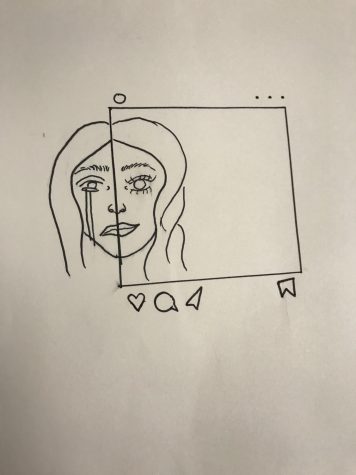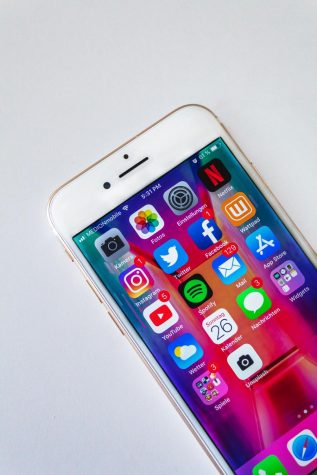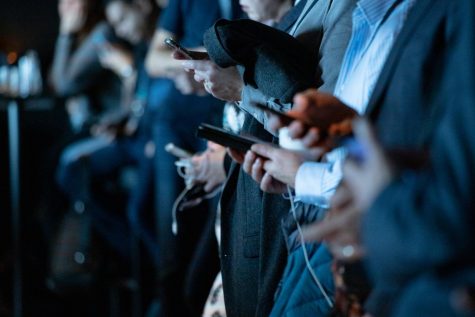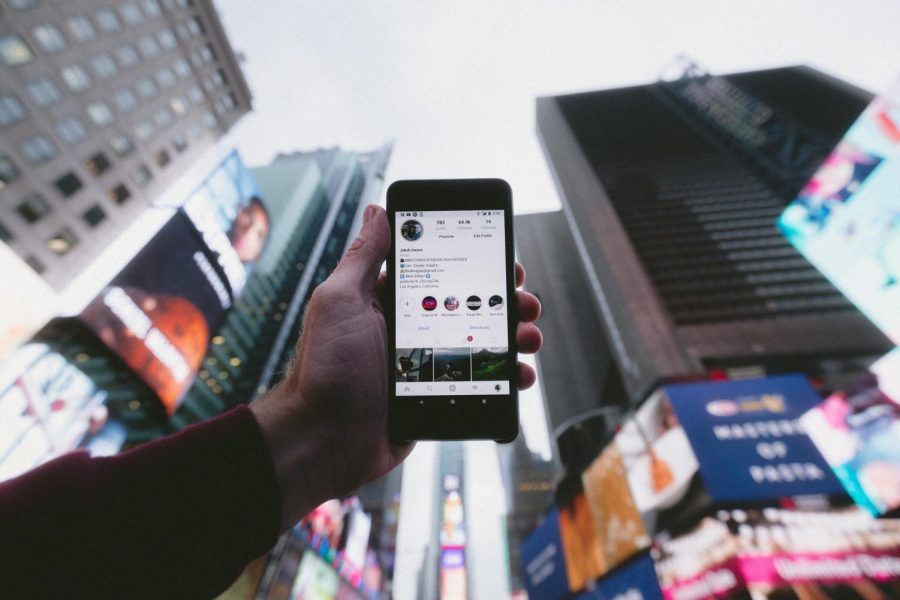Hypnosis Through the Screen
February 14, 2020
Why are their lives so much better than mine? Why are they so much more attractive than me? How are they so much happier than me? Their life is perfect.
Comparisons are easy to make, most notably in the new world of technology and social media. With every swipe, we are presented with an image that has been photoshopped to perfection.
It comes as no surprise that people most often present the best parts of their life and leave the not so pretty parts away from the public eye. Life online has become a completely different universe, a distorted reality, if you will. Think about it. How often do you see people posting about their weight gain or failed diet plans? How often do you see gym pictures or a picture of a “yummy” low-calorie meal, portraying their healthy lifestyle? 
We have access to all sorts of new apps and features on our phones that help us distort our reality. We can smooth over blemishes, erase stretch marks, and completely get rid of insecurities. A junior here at the colony said, “With so many photoshopping and editing apps right at your fingertips, why wouldn’t you go the extra mile to make yourself appear to be a little more perfect? I have terrible acne, and all it takes is a couple of taps, and suddenly I have clear skin.” It’s easy to blur your imperfections, but by doing so, you are also blurring your sense of reality. Acne is normal! We look at these pictures and think, “Wow, their life is perfect!” and we get down on ourselves for not being like the image on our screen. We set standards for ourselves based on what we see, and we don’t stop and think twice about how completely unrealistic those standards might be. All these perfect pictures surround us but it goes unsaid and unnoticed that the image we are seeing is a final, edited draft, all made up and ready to present to the public.
 The pictures we post so often are shared with the hopes of getting others to envy us. With every like and comment we receive, our brain gets a hit of dopamine, which is a neurological chemical that makes us feel happy and satisfied. It is a vigorously addicting cycle. A Harvard study relates this to the way people react to cocaine saying, “Cognitive neuroscientists have shown that rewarding social stimuli—laughing faces, positive recognition by our peers, messages from loved ones—activate the same dopaminergic reward pathways.” However, it is the opposite when we receive bad feedback or no feedback at all. It almost feels worse when we don’t get attention online than when we don’t get attention in person. We want to be seen and appreciated. We want to feel envied. If we don’t receive the right kind of attention, it can lead to unhealthy insecurities and even depression.
The pictures we post so often are shared with the hopes of getting others to envy us. With every like and comment we receive, our brain gets a hit of dopamine, which is a neurological chemical that makes us feel happy and satisfied. It is a vigorously addicting cycle. A Harvard study relates this to the way people react to cocaine saying, “Cognitive neuroscientists have shown that rewarding social stimuli—laughing faces, positive recognition by our peers, messages from loved ones—activate the same dopaminergic reward pathways.” However, it is the opposite when we receive bad feedback or no feedback at all. It almost feels worse when we don’t get attention online than when we don’t get attention in person. We want to be seen and appreciated. We want to feel envied. If we don’t receive the right kind of attention, it can lead to unhealthy insecurities and even depression.
So how can we fix this problem? We can’t. Not on a societal scale, at least. However, personally, you can choose to make life-changing alterations in the way you use, perceive, and post to social media. First and foremost, it is crucial to regulate your social media use. Be aware of how long you are on social media and what kind of content you search. Are you using social media for so long that it impacts your productivity in other areas? Are you viewing the type of content that triggers comparison? If so, take a step back from social media for whatever amount of time suits your personal needs. When you are on social media, keep in mind that not everything is as it seems. Remember how distorted most pictures are and that nobody is perfect, no matter how put together they may seem. Keep the same things in mind when you are posting to social media too. Nobody will love you less because of a pimple or a stretch mark. You are special, just the way you are. Lastly, If you find yourself saying anything mentioned in the first paragraph, CUT IT OUT! Comparisons deteriorate our self-confidence. Now it’s your turn to spread positivity online. I leave you with my favorite quote, “ Be the change you wish to see in the world.”- Mahatma Gandhi 6



